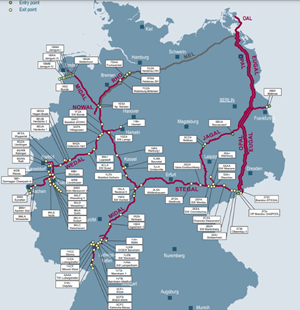News
Gascade's vision for the European H2 network
Tyler Campbell, Managing Editor, H2Tech
In the ever-evolving landscape of energy infrastructure, hydrogen (H2) emerges as a promising alternative, offering a pathway to a greener, more sustainable future. Isabell Kolonko, Business Developer for Gascade Gastransport GmbH delivered a presentation titled “Hydrogen network development: A keystone from the European perspective” to describe the company’s role as a player in the development of H2 networks in the Baltic Sea and the Northern Sea regions.
Gascade, headquartered in Kassel, Germany, boasts a workforce of around 500 dedicated employees. Their pipeline network spans 3,700 kilometers (km), serving as a vital part of gas transportation. Gascade's vision for the H2 network aligns with the broader European push towards decarbonization. Kolonko’s presentation began with the company's strategy for the Baltic and Northern Sea areas.
“We are planning to repurpose a large section of our existing grid in the onshore national area of Germany,” said Kolonko. “Our North Sea pipeline project will be able to transport H2, which will be produced in the German exclusive economic zone and Norway.” Securing Projects of Common Interest (PCI) status marks a significant milestone, paving the way for the project's feasibility assessment and eventual construction, slated to commence in the coming decade.
Several nations have placed their bets on H2 as a versatile alternative, with the potential to replace a portion of natural gas usage. This shift is driven by the imperative to decarbonize economies and integrate intermittent renewable energy sources into the power grid. Germany, once heavily dependent on Russian gas, particularly emphasizes transitioning towards H2 amid geopolitical tensions triggered by the Ukraine conflict.
Gascade's vision extends to collaborating with several countries and key stakeholders, including prominent transmission system operators (TSOs) like Santos and Bureau Veritas. This ambitious undertaking involves repurposing a substantial portion of existing infrastructure to facilitate the seamless transmission of H2 across Europe.
Kolonko went on to describe the scope of the project, encompassing an intricate network spanning from Denmark to the Czech Republic, France and Austria. According to Kolonko, operations are planned to commence by 2025, and Gascade plans to gradually scale up capacity to full operational readiness by 2035.
“We are not planning any new construction for the project, but utilizing existing infrastructure that we now use for gas transport,” Kolonko said. “What we are currently looking at is a fully green H2-based energy supply for Europe transported via pipelines. Additionally, this infrastructure should be used to remove the pressure from electricity only solutions and individualized H2 transport solutions.”
Gascade's innovative initiatives show the impact H2 can have on Europe's energy landscape. With this strategy, Gascade has the potential to lead the way in establishing a sustainable energy infrastructure, paving the path towards a more environmentally friendly future.


